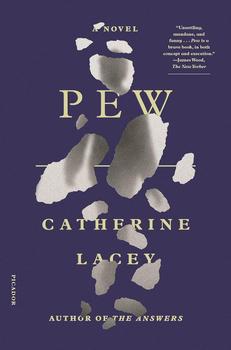Summary | Excerpt | Reviews | Beyond the Book | Readalikes | Genres & Themes | Author Bio

I don't know how it all came to this.
It seems that time is somewhere else and what I can see here is not the present, but is, instead, the future, an eventual future, and somehow the present moment is back there somewhere I cannot reach and I'm stuck living here, in some future time. This body hangs beneath me, carries me around, but it does not seem to belong to me, and even if I could see them, I would not recognize my own eyes.
Now, never sleeping, I think often of the way life blinks at you when waking. I miss that kind of beginning, being given another day, taking another day, something that's yours, only yours, only yours and everyone else's.
If you do manage to have a night's sleep in a church, you'll notice how nice it is to wake up there. It will almost make you want to believe in God if you don't believe in God, and if you do believe in God, it will be a nice pat on the back for you. It must be so nice to be patted on the back in this way, to walk always followed by this constant, gentle pat.
IN A GAS STATION BATHROOM—piss on the floor, tampon machine, urinal, an open stall—I locked the door and stripped bare to throw water on my skin.
In a cracked mirror I saw these legs, saw these arms. I shut my eyes and tried to remember that body, but under shut lids the mind saw nothing, could not remember in what it was living. Again, I opened my eyes—saw this body. Maybe wider in some places, narrower in others, and some parts were soft, and some were firm, and where my legs met, there was something I knew to protect, though I could not say why.
When I put clothes on again, all memory of what this body was or is vanished beneath the cloth. It must be that I—whatever I am—am lying on the floor of a canoe, lying there, looking up at the sky. I am unable to sit up or move. I cannot remember getting into the canoe. Sometimes I hear people speaking to the canoe as if they are not aware that I am in here. Yes, that's what it feels like, what living feels like. Why is it so difficult to say as much? It never seems I can describe it clearly enough.
Once someone said I had a slender neck, a woman's neck, they said, a woman's neck growing from the thick shoulders of a man, but maybe it was the other way around—slender shoulders and a thick neck. Anything I remember being told about my body contradicts something else I've been told. I look at my skin and I cannot say what shade it is. I look into a mirror and see nothing in particular. It seems I am sitting somewhere within all this skin and muscle and bone and fat and hair. Can only other people tell you what your body is, or is there a way that you can know something truer about it from the inside, something that cannot be seen or explained? Over time, I know, bodies change—they expand and contract, skin turns papery or thick, new bodies grow within other bodies, limbs grow musky and must be cleaned, organs smuggle tumors through the dark—but isn't there something else? Something unseen. Why can't we ever speak to it?
In a gas station late at night the cashier gave me a biscuit and a wet hot dog. She showed me black-and-white photographs of herself from long ago—a young woman in high white boots, short hair round and firm and pure black. There in the gas station her hair had gone loose and gray. She did not ask me my name. She called me baby, called me sugar, gave me a sip of whiskey from her flask and let me sleep behind the counter. We were some distance from anything else, flat nothing around us, an unearthly glow rising from a town on the horizon. I slept on the floor while she sat up on a stool holding a newspaper in her lap, the other hand resting near a rifle. She was one of the few I've known who somehow knew to peer over the edge of this canoe and see me lying here—hello.
What are you? I was sometimes asked and I know it's rude to answer a question with a question but I have sometimes allowed myself to be rude in this way. I used to ask those askers, What are you? And what a horrible question to say or hear. I regret ever asking it. Sometimes they answered me: I'm a Christian, an American, I'm black, white, not from here, I'm hungry, I'm tired, angry, a woman, a man, a gay man, a pastor, Republican, mother, son, I'm forty-three years old, I'm homeless, or sometimes they answered me with a laugh that rose and fell in their chests before it wandered away, leaving nothing behind.
Excerpted from Pew by Catherine Lacey. Copyright © 2020 by Catherine Lacey. Excerpted by permission of Farrar, Straus & Giroux. All rights reserved. No part of this excerpt may be reproduced or reprinted without permission in writing from the publisher.
Finishing second in the Olympics gets you silver. Finishing second in politics gets you oblivion.
Click Here to find out who said this, as well as discovering other famous literary quotes!
Your guide toexceptional books
BookBrowse seeks out and recommends the best in contemporary fiction and nonfiction—books that not only engage and entertain but also deepen our understanding of ourselves and the world around us.